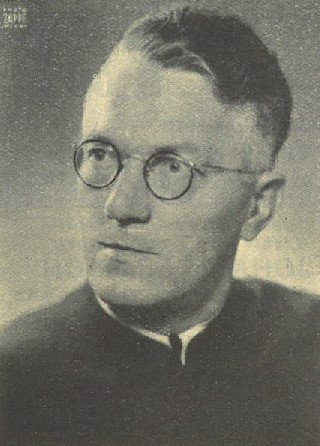Dr. Heinrich Zeder

Personalia
Born:
Died:
Profession:
Persecution:
Detention 30.07.1941 - 05.04.1943
Memberships
Curriculum Vitae
A carpenter's son from Röschitz, Heinrich Zeder, attends the grammar school in Hollabrunn after elementary school. At this time, a Catholic secondary school fraternity Rugia (today in Retz) existed in Röschitz, to which the driving students attending the Hollabrunn grammar school in particular belonged. He joined this Rugia.
In 1923, Heinrich Zeder graduated and went to Vienna to study theology. He soon came into contact with colour-wearing secondary school students and became a member of the secondary school fraternity Thuringia Wien at Christmas 1924. In 1925 he joined the ÖCV and became a member of the student fraternity Nordgau. He completed his theological studies with a doctorate in theology. After his ordination as a priest in 1927, he became chaplain in Orth an der Donau; in 1931 he moved to St. Johann Evangelist in Vienna's 10th district, where he lived and worked intermittently until his death. He is a member of the Christian-German Gymnastics Association (now the Sports Union) and the Patriotic Front.
'Mr. Kaplan, you will understand, you have had a long time to find your way to the National Socialists, but we haven't, we can't change from morning to afternoon and march with them. That would be some kind of confession. We'd have to work hard and bitterly to achieve that. So, you're not angry if we refuse and don't march along.' - the young people to the chaplain.
'Na, as you like. It's not my business. You may have to suffer as a result.' - is the answer.
'Yes, we could sing, speak and hold Bible studies etc. within the framework of a liturgical community', of course I already knew that anything else was dangerous, 'within the framework of a liturgical community we could sing, speak and hold Bible studies etc.'. That's what I did, I founded this liturgical community [in 1939].
This is why he is summoned and warned by the Gestapo.
Heinrich Zeder is also interrogated and cautioned for listening to the radio. His contacts with the "Austrian Freedom Movement" around Roman Scholz and Walter Urbraz in Klosterneuburg as well as his membership in the ÖCV make him an additional suspect. When ordered to remove the crosses from school classrooms, he preached a sermon on the cross and advised parents to buy their children a necklace with a cross.
Buy your children a cross instead of other things! Hang it around their necks, and when they're at school, they'll have the cross with them and even closer.
As a result, he was arrested on July 30, 1940 and taken into custody. After several months in Viennese prisons - six months in the Rossauer Lände ["Liesl"] police prison, transferred to the prison at Margareten District Court on September 11, 1940, from March 1941 in the prison at Provincial Court I - he was taken to [Willich-]Anrath near Krefeld (North Rhine-Westphalia) with other members of the resistance group in July 1941. He spent eight months in the "Hell of Anrath", including three days in solitary confinement in the cellar. In between, he was transferred to prison in Mönchengladbach for 15 months. Here, together with Father Theoderich from Wilhering Abbey, he publishes a small religious monthly without being discovered. He returned to Anrath in February 1943 and was released to Vienna on April 5, 1943 after a total of 32 months in prison.
On December 4, 1943 and February 25, 1944, a trial was held before the People's Court in Vienna, but he did not make any statements. He is therefore sentenced to two years in prison for violating the duty to report (§ 138 RStGB) "failure to report a highly treasonous undertaking", although this has already been served as a result of his imprisonment. In order to avoid the Gestapo's suggestion that he become an "agent for church affairs" and to avoid further persecution by the Gestapo, he enlists in the German Wehrmacht. He took part in the last battles in the West and was taken prisoner of war by the Americans in Solingen in mid-April 1945.
Places
Place of activity:
Citations
- Krause, Peter/Reinelt, Herbert/Schmitt, Helmut (2020): Farbe tragen, Farbe bekennen. Katholische Korporierte in Widerstand und Verfolgung. Teil 2. Kuhl, Manfred (ÖVfStG, Wien), p. 395/396.
